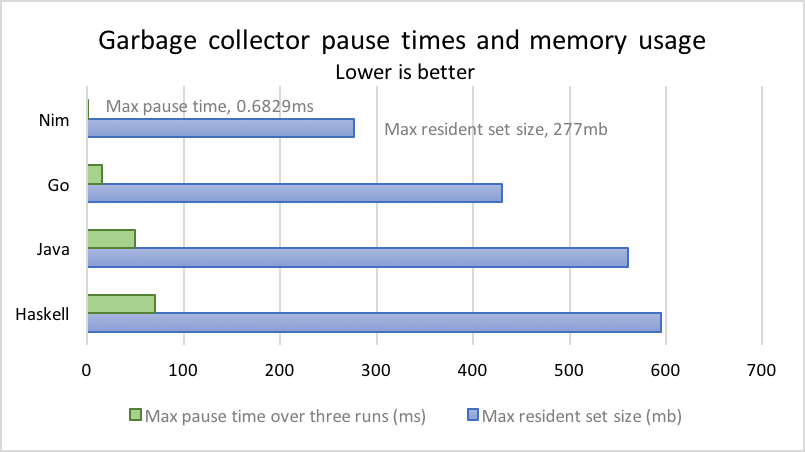C++ as Assembly 2.0 - Hello Nim
by Viktor Kirilov
subtitle: every talk I make is a lightning talk
and this one is going to be intense - sorry :|
Me, myself and I
- my name is Viktor Kirilov - from Bulgaria
- used to be into game development, currently into databases
- creator of doctest - the fastest C++ testing framework
- implemented hot code reloading in the Nim compiler
- still needs a bit more work :|
- I write C++ for a living but I dream of Nim

Nim
- Started in 2005 by Andreas Rumpf (still the main dev)
- strongly typed, compiled, multi paradigm, indentation based
- some of the most powerful metaprogramming
- "Speed of C, elegance of Python, power of Lisp/Perl"
- "Nim is to C/C++ as CoffeeScript is to JavaScript"
- aims to dominate in any space
- compiled to C / C++ / Javascript / Objective C
- can run on any platform (including the browser)
- generates high performance code and standalone binaries
Hello
echo "Hello World" # codenim c hello.nim # compile./hello # runHello World # stdoutSome code...
import strformat # can also import specific parts and give aliases
type
Person = object
name: string
age: Natural # Ensures the age is positive
# Types in Nim: arrays, sequences, tuples, sets & objects
let people = [
Person(name: "John", age: 45),
Person(name: "Kate", age: 30)
]
# Proc means function
proc doWork() =
# Indentation based - like Python
for person in people:
# Type-safe string interpolation, evaluated at compile time.
echo(fmt"{person.name} is {person.age} years old")
doWork() # and we get some outputDiscriminated Unions - "Variants"
# This is an example how an abstract syntax tree could be modelled in Nim
type
NodeKind = enum # the different node types
Int, # a leaf with an integer value
String, # a leaf with a string value
Add, # an addition
Sub, # a subtraction
If # an if statement
Node = ref object
case kind: NodeKind # the ``kind`` field is the discriminator
of Int: int_val: int
of String: str_val: string
of Add, Sub: # '+' or '-'
left, right: Node
of If:
condition, then_part, else_part: Node
var n = Node(kind: Int, int_val: 42)
if n.kind notin {Add, Sub, If}: # easy work with sets/flags/enumerations
echo "it's a value!"
# raises a `FieldError` exception, because n.kind is Int and not String
n.str_val = ""
OOP in Nim
type
Note* = ref object of RootObj
text: string
TaskNote* = ref object of Note
completed: bool
method render*(note: Note): string = # the object is the first argument
return note.text
method render*(note: TaskNote): string =
case note.completed
of true: return "☑ " & note.text
of false: return "☐ " & note.text
var baseType: Note = TaskNote(text: "Do me soon!", completed: false)
echo baseType.render() # polymorphic call - outputs "☐ Do me soon!"- object as first argument & uniform call syntax: func(obj) == obj.func()
- encapsulation through modules (exports are explicit - with *)
- subtyping via single inheritance
- method (not proc): dynamic binding (polymorphism)
- for dynamic dispatch on multiple parameters: --multimethods:on
Effect system - transitive
proc writeToConsole() =
echo "is IO a side effect?"
var glob = 5
proc touchGlobal() =
glob = 6
proc impossible() {.noSideEffect.} = # will be checked within the whole program
writeToConsole() # this won't compile because of the "echo"
touchGlobal() # this won't compile either - because of the global var access
proc complex() {.raises: [IOError, ArithmeticError].} = # only these can be thrown
#...
proc simple() {.raises: [].} = # no exceptions can pass through
#...- tracks side effects (like no global variable access)
- tracks exceptions
- tracks tags - "ReadIOEffect", "WriteIOEffect", "ExecIOEffect"
- tracks locking levels ==> deadlock prevention at compile-time
- tracks "GC safety" (no side effects ==> GC safe)
- user extensible
Distinct types - "strong typedefs"
# example defining a currency
type
# or use {.borrow.} here to reuse everything
Dollars = distinct float
proc `+`(a, b: Dollars): Dollars {.borrow.}
var a = 20.Dollars
a = 25 # Doesn't compile
a = 25.Dollars # Works fine
a = 20.Dollars * 20.Dollars # Doesn't compile
a = 20.Dollars + 20.Dollars # Works fine
- This would be a ton of (slow-to-compile) code in C++
- No more NASA failures for 500$ million because of unit issues
Meta-programming
- when a program reads, generates, analyzes or transforms other programs
- why do it
- higher levels of abstraction and thinking
- can enforce better coding patterns
- can optimize code – by compile-time rewrites
- think expression templates in C++
- can increase code readability and maintainability
- with great power comes great responsibility
What is an AST (Abstract Syntax Tree)
while b ≠ 0
if a > b
a := a − b
else
b := b − a
return a
Meta-programming in Nim
- levels of complexity in Nim:
- normal procs and inline iterators
- generic procs and closure iterators
- templates << expand & replace AST nodes
- macros << can manipulate the AST in any way
- respects the type system
- unlike template engines & other mechanisms
- *cough* C preprocessor *cough*
- unlike template engines & other mechanisms
- NimVM - responsible for:
- expansion & execution of templates & macros
- compile-time evaluation of code/expressions/constants
Templates
template withLock(lock: Lock, body: untyped) =
acquire lock
try:
body # <<< this is where the 'block' of code will go
finally:
release lockvar ourLock: Lock # create a lock
initLock ourLock # init the lock
withLock ourLock: # here we use the template and pass a code block
echo "Do something which requires locking"
echo "This might throw an exception"var ourLock: Lock # this code was written out of the template
initLock ourLock # this code was written out of the template
acquire ourLock # the result after the substitution - no "template call"
try:
echo "Do something that requires locking"
echo "This might throw an exception"
finally:
release ourLockTemplates 2
template withFile(f_var: untyped, # name of the file variable
filename: string, # file to open
mode: FileMode, # file open mode
body: untyped) = # the block of code
let fn = filename # to prevent double evaluation of 'filename'
var f_var: File
if open(f_var, fn, mode): # first use of 'fn'
try:
body # <<< this is where the 'block' of code will go
finally:
close(f_var)
else:
quit("cannot open: " & fn) # second use of 'fn'
withFile(txt, "ttempl3.txt", fmWrite): # f_var will be 'txt'
txt.writeLine("line 1")
txt.writeLine("line 2")Templates - pattern matching constructs
# match multiplication of integers and the literal '2'
template optimMultiply{`*`(a, 2)}(a: int): int = a + a
let x = 3
# will use addition instead of multiplication - not
# really useful since the C/C++ optimizer would handle
# this specific case, but this showcases the power of Nim
echo x * 2
# not going to match this because it's '3' and not '2'
echo x * 3# this definition exists in the System module
template `!=` (a, b: untyped): untyped =
not (a == b)
assert(5 != 6) # the compiler rewrites that to: assert(not (5 == 6))Dumping the AST of a code block
import macros # 'macros' module for working with the AST
# inspect the AST hierarchy of any block of code
dumpTree:
var mt: MyType = MyType(a:123.456, b:"abcdef")# the output from dumpTree
StmtList # list ot statements
VarSection # var statement
IdentDefs # identifier definition
Ident "mt" # name of var - an identifier
Ident "MyType" # type of var - an identifier
ObjConstr # constructor
Ident "MyType" # identifier to call for construction
ExprColonExpr # ... you get the picture
Ident "a"
FloatLit 123.456
ExprColonExpr
Ident "b"
StrLit "abcdef"Macros - the explicit interface (low-level)
import macros, strutils # 'macros' module for manipulating the AST
macro toEnum(words: static[string]): untyped =
# in Nim procs and macros have an implicit "result" variable
# here we create a new tree node of type 'Enumeration'
result = newTree(nnkEnumTy, newEmptyNode())
# we split the words string on whitespace and iterate over them
for w in splitWhitespace(words):
# and we add identifier nodes as children to the enumeration
result.add ident(w)
type
Color = toEnum"Red Green Blue Indigo"
# Indigo is a valid identifier after the NimVM
# has gone through the call to "toEnum"
var color = IndigoGetting the code to construct a code block
import macros # 'macros' module for working with the AST
dumpAstGen: # this will dump Nim code to create the code we have passed it
proc hello() =
echo "hi"nnkStmtList.newTree( # the procedure definition statement
nnkProcDef.newTree( # the procedure definition
newIdentNode(!"hello"), # identifier - the name
newEmptyNode(),
newEmptyNode(),
nnkFormalParams.newTree( # no parameters
newEmptyNode()
),
newEmptyNode(), # empty (for pragmas, etc.) - our 'hello' proc is too simple
newEmptyNode(),
nnkStmtList.newTree( # the list of statements in the proc
nnkCommand.newTree( # a function call
newIdentNode(!"echo"), # we call 'echo'
newLit("hi") # and we pass it 'hi'
)
)
)
)Executing the output from dumpAstGen
import macros # 'macros' module for working with the AST
macro generate_hello(): typed =
result = nnkStmtList.newTree( # the output from dumpAstGen (from last slide)
nnkProcDef.newTree(
newIdentNode(!"hello"),
newEmptyNode(),
newEmptyNode(),
nnkFormalParams.newTree(
newEmptyNode()
),
newEmptyNode(),
newEmptyNode(),
nnkStmtList.newTree(
nnkCommand.newTree(
newIdentNode(!"echo"),
newLit("hi")
)
)
)
)
generate_hello() # create the hello() proc from the last slide
hello() # hello() now exists!!! and when called will print "hi""quote do:" expressions - less verbose
import macros # 'macros' module for manipulating the AST
type
MyType = object # some random type with 2 fields
a: float
b: string
macro myMacro(arg: untyped): untyped =
var mt: MyType = MyType(a:123.456, b:"abcdef") # an arbitrary value
let mtLit = newLit(mt) # convert the value into a NimNode tree
# here we put literally the code we want
# we inject NimNode symbols with backticks
result = quote do:
echo `arg`
echo `mtLit`
myMacro("Hallo") # call the bad boy
# The call to myMacro will generate the following code:
echo "Hallo"
echo MyType(a: 123.456'f64, b: "abcdef")HTML DSL (Domain Specific Language)
import html_dsl
# no need for third-party
# templating engines
html page:
head:
title("Title")
body:
p("Hello")
p("World")
dv:
# we can mix code with
# the HTML view
for i in 0..3:
p "Example"
echo render(page())<!DOCTYPE html>
<html class='has-navbar-fixed-top'>
<head>
<meta charset="utf-8">
<meta name="viewport"
content="width=device-width">
<title>Title</title>
</head>
<body class='has-navbar-fixed-top'>
<p >Hello</p>
<p >World</p>
<div>
<p>Example</p>
<p>Example</p>
<p>Example</p>
</div>
</body>
</html>Protobuf implementation: no external tool
import protobuf # module can be fetched from the package manager
# Define our Protobuf specification
const protoSpec = """syntax = "proto3";
message ExampleMessage {
int32 number = 1;
string text = 2;
SubMessage nested = 3;
message SubMessage {
int32 a_field = 1;
}
}
"""
# Generate Nim code to use it - invoking a full Protobuf parser
parseProto(protoSpec)
# Create messages using the already constructed Nim types
var msg = new ExampleMessage
msg.number = 10
msg.text = "Hello world"
# We even have helper functions for working with sub-messages
msg.nested = initExampleMessage_SubMessage(aField = 100)What meta-programming gives us
- higher level zero-cost abstractions
- can help enforce patterns
- can help readability & maintainability
- can create a DSL (Domain Specific Language)
- as seen with the HTML example
- GUI creation & bindings
- writing serialization & deserialization functions is a thing of the past
- iterate over the fields of types at compile time - never forget anything!
- no need for third-party code generators and template engines
- Nim's high performance asynchronous IO framework (async/await)
- implemented as an ordinary library extension built on coroutines
- instead of as a core language feature - keeping the language small!
- https://www.youtube.com/watch?v=hwArqelfBBY
- implemented as an ordinary library extension built on coroutines
- https://hookrace.net/blog/introduction-to-metaprogramming-in-nim/
Feature dump (Incomplete)
- function call parens are optional - echo("hello") OR echo "hello"
- ~destructors
- generics - HashSet[string] - can work with other types
- concepts - constraints for generics
- pattern matching
- converters for implicit conversions - need to be explicitly written
- extensible pragmas
- defer - basically for "ON_SCOPE_EXIT" cleanup code
- exceptions (reuses the C++ machinery when compiled to it - can interop!)
- explicit "discard" keyword for unused results of functions
- named and default arguments
- statements are expressions
- iterators & closures (generators / coroutines / resumable functions)
- functions are first-class citizens (facilitating functional programming)
- package manager (distributed) - based on Git & Mercurial
Nim compilation & runtime model
- nim c -d:release main.nim
- always compile only the main file, follow the imports
- whole program analysis
- a .c file for each .nim file in a "nimcache" (temp) folder (also .obj files)
- only referenced (imported) modules & symbols are compiled in the end
- Startup: a DFS traversal, Output: "foo" => "BAR!" => "main"
- entire project is always "compiled" by Nim (currently no "minimal" rebuild)
- ~4-5 sec for the entire source of Nim - 150+ files (without the C compiler)
- the C/C++ compiler rebuilds only changed files (takes a bit more time)
- "incremental recompilation" (IC) is the next big thing for Nim
# main.nim
import foo
# there is no main() function
echo from_foo()
echo "main" # global scope code# foo.nim
import bar
proc from_foo*(): string =
return from_bar
echo "foo" # global scope code# bar.nim
let local = "BAR!"
let from_bar* = local
^
# '*' means 'exported'Nim procs to C/C++ (simplified)
# foo.nim
proc foo() =
echo "hello"
foo()// == includes section
#include <nimbase.h> // nimbase is always present
// == type definitions section
struct TGenericSeq { int len; int reserved; };
struct NimStringDesc : public TGenericSeq { ... };
// == constants & globals section
STRING_LITERAL(the_string_literal, "hello", 5);
NimStringDesc the_string_constant(the_string_literal);
// == forward declarations section
void foo_iineYNh8S9cE6Ry7dr2Tz2A(); // mangled name
// == definitions section
void foo_iineYNh8S9cE6Ry7dr2Tz2A() {
echoBinSafe(the_string_constant, 1); // the echo call
}
// == init section
void init_module_foo() {
foo_iineYNh8S9cE6Ry7dr2Tz2A(); // << call
}
// == other sections - omitted for simplicity
// ...Nim types to C/C++ (simplified)
type
MyData = object
answer: int
ready: bool
proc newData(): MyData = return MyData(answer: 42, ready: true)
echo newData().answer// == type definitions section
struct MyData {
int answer;
bool ready;
};
// == definitions section
tyObject_MyData newData() {
MyData result; // always an implicit "result"
result.answer = ((int) 42);
result.ready = true;
return result;
}
// == init section
void init_module_foo() {
MyData T2_;
T2_ = newData(); // << call the construction
echoBinSafe(T2_.answer, 1); // the echo call
}Nim compilation to C/C++: a BIG win
- smaller scope for the compiler
- all the cutting-edge optimization from C/C++ compilers for free
- out-of-the-box support for tons of platforms
- easiest C/C++ interop possible
- exceptions - reusing those of C++ when using that backend
- nim to C/C++ code mapping with #line directives for debuggers
- no generated headers for the exported parts of modules
- each .c/.cpp file contains everything (and only what) it needs
- forward declarations for external functions
- type definitions
- each .c/.cpp file includes nimbase.h and a few C stdlib headers
- high level macros & templates => simple structs and functions
Interfacing with C/C++
proc printf(formatstr: cstring)
{.header: "<stdio.h>", importc: "printf", varargs.}{.emit: """
using namespace core;
""".} # emits C++ code! can also do inline assembly
{.compile: "logic.c".} # compile & link this .c fileother pragmas - for use in Nim:
We can also call Nim code from C/C++:
# fib.nim
proc fib(a: cint): cint {.exportc.} # do not manglenim c --noMain --noLinking --header:fib.h fib.nim// user.c
#include <fib.h>Interfacing with C/C++
- Anything possible in C++ is possible in Nim
- The best possible C/C++ interoperability out of any language
- c2nim tool - generate C/C++ bindings for Nim
- nimterop tool - based on tree-sitter - discussion
type # here we define a generic type which maps directly to std::map
StdMap {.importcpp: "std::map", header: "<map>".} [K, V] = object
proc `[]=`[K, V](this: var StdMap[K, V]; key: K; val: V) {.
importcpp: "#[#] = #", header: "<map>".} # we import the [] operator
var x: StdMap[cint, cdouble] # and we use it directly...
x[6] = 91.4std::map<int, double> x;
x[6] = 91.4; // no binding layer - C++ types/functions are called directlyC++ template constructs
Generated C++
Nim has a GC (⊙_☉) => (┛ಠ_ಠ)┛彡┻━┻
- Different garbage collectors - more info here and here
- Soft real-time deferred RC'ing GC, Mark and Sweep, Boehm, even Go!
- We have a lot of control - unlike in other languages
- when the GC should run
- soft real-time guarantees - for how long it is allowed to run
- each thread has its own GC - they don't wait for each other!
-
GC can be avoided, and can be turned off even now!
-
value-based types, destructors, stack & manual heap allocation
- type Foo = object => on the stack, no GC ever.
- type Bar = ptr object => equivalent raw C pointer, no GC ever.
- stdlib will be eventually free of GC use
-
type Baz = ref object => GC-managed object
- deferred reference counting (only if survives it's creation scope)
-
value-based types, destructors, stack & manual heap allocation
Nim's GC - time & memory use

Runtime - small binaries

- https://github.com/dom96/binary_size
- Only assembly truly has no runtime - even C does
- Disclaimer: this might need to be updated :|
Nim backends - even the web!

- C code can also be compiled to WASM or asm.js and run in the browser!
- in addition to the normal JavaScript compilation
- True isomorphic programming - 1 language for backend & frontend
- cross compilation: ship .c files with a compile.sh script to any platform
The web
import dom # only for the javascript backend
proc onLoad(event: Event) =
let p = document.createElement("p")
p.innerHTML = "Click me!"
p.style.fontFamily = "Helvetica"
p.style.color = "red"
p.addEventListener("click",
proc (event: Event) =
window.alert("Hello World!")
)
document.body.appendChild(p)
window.onload = onLoadJester - a Sinatra-like web framework
import htmlgen, jester, re # html, server & regular expressions
routes:
get "/hello/@name?":
# This matches "/hello/fred" and "/hello/bob" => ``@"name"`` will
# be either "fred" or "bob". It will also match "/hello/".
if @"name" == "":
resp "No name received :("
else:
resp "Hello " & @"name"
# Matches URLs of the form /15.html => request.matches[0] will be 15.
get re"^\/([0-9]{2})\.html$":
resp request.matches[0]
# A greeting for the root
get "/":
resp h1("Hello world")On C++...
- C++ is a dinosaur - both in terms of age and size
- have you seen the spec?
-
Expert-friendlyExpert-tolerable - easy to shoot yourself in the foot
- compile & link times are huge
- no standard package manager & build system
- multiple languages - the normal one, preprocessor, TMP
- oh... the preprocessor...
- and oh... the TMP... the SFINAE... the tricks... the errors... the horror...
- no static reflection in 2019? really?
- It takes more than 5k LOC to implement <optional> - a value and a bool...
- think about that... a value T and a bool...
- and what about variant (discriminated union)? or safe_int? or units?
More on C++...
- Compilation model is based on compiling source files in isolation
- No whole-program view of things without LTO
- But LTO is only for optimization - what about cross-TU analysis on the original language and not on the low-level LLVM IR? So much context gets lost...
- The lifetime analysis effort from a few years ago?
- gradually being dumbed down - it's too hard - will never get to "Rust level"
- How about enforcing a transitive effect system or checking exception specifications at compile time? Forget about it...
- Zero-cost abstractions? They ain't free - we pay at build time...
-
Reparsing the same headers - up to the tens of megabytes per translation unit
- and we reinstantiate the same templates...
- and the linker has to remove all duplicated weak (inline) symbols...
- C++20 Ranges: 20 line example - 3 seconds of compile time, Debug build really slow
- Sometimes we don't entirely remove the abstractions even in Release builds...
-
Reparsing the same headers - up to the tens of megabytes per translation unit

My "favourite" aspect of C++
Clean slate - the C++ successor is here
- Big reasons it's hard to switch away from C++:
- legacy and maturity - too much software written already - big investment
- inertia - attachment and lack of interest to learn new languages
- C++ isn't breaking backwards compatibility anytime soon (which is good IMHO)
- there is a proposal to introduce "C++ epochs" just like in Rust - doubt it...
- C++ is a HUGE time/money cost on the scale of hundreds of millions
- developer productivity (build times in the hours), bugs & safety
- In C++ we are constantly solving unimportant problems
- headers/sources, forward declarations, thinking how not to include X
- dealing with absurdly complicated TMP
- 5k LOC for optional - a value T and a boolean !!!
- In C++ we are constantly solving unimportant problems
- developer productivity (build times in the hours), bugs & safety
- C++ is a great and valuable ongoing research - let's learn from it and iterate
- I know about modules, concepts, constexpr & the reflection TS... not good enough!
- Nim can reuse all the C/C++ software and is wildly superior...
Rust & Nim
-
shortcomings or Rust
- because of the borrowing & lifetime checks
- hard to learn
- slow to compile & work with
- meta-programming nowhere close to Nim
- {} braces? really? :D (nitpicking...)
- because of the borrowing & lifetime checks
- Ownership & borrowing semantics can be done in Nim too!
- Even without them Nim is much safer than C/C++
-
Cross-language LTO between C++ & Rust - congrats
- But that comes out-of-the-box when using Nim!
- Microsoft are looking into Rust - look at Nim as well !!!
Why programming languages matter
- I recently realized how connected thinking and languages are
- And that translates to programming as well...
- Human minds can only handle a finite amount of complexity, so how sophisticated a software system can get depends on how efficiently this complexity budget is used.
- Browse the source of the Apollo 11 mission - we've gone pretty far...
- Some people say the amount of bugs per 1k LOC is constant
- don't quote me on this - I read it on the internet !!!
- Better abstractions don't necessarily degrade performance
- Programming languages play a fundamental part in the fastest technological change of our civilization - let's pay respect to that fact
-
Java had a $500 million marketing campaign in 2003 alone... (video)
- Python rose to the top 10 "slowly and steadily"
Demo - compiling Nim
Nim is written in Nim
~150 .nim files => 24 sec
(4-5 sec Nim, 20 sec C compilation)
Popularity based on GitHub stars - Rust

Rust is just being Rust :|
Popularity based on GitHub stars - Nim

A bit more curved than Rust - same 9 year span - more momentum!
Final thoughts
- We have only scratched the surface
- Nim has the potential to be a major programming language
- Version 1.0 is out - a "promise" of stability
- Small standalone & performant binaries without a VM
- Can easily leverage existing C/C++/JavaScript code
- Systems programming, embedded, AAA games, enterprise, web
- GC can be avoided, Rust-like safety can be added
- Currently backed by Status - one of the top 100 cryptocurrencies
- they are developing an Ethereum 2.0 client in Nim
- Many cool things incoming
- "incremental compilation" (module cache), REPL, and more
- Join the community! You can have a big impact
Final Final thoughts
- Speed of C
- Elegance of Python
- Power of Lisp/Perl
Can you understand my bias now? :)
guilty of not talking about functional languages :|

Q&A
